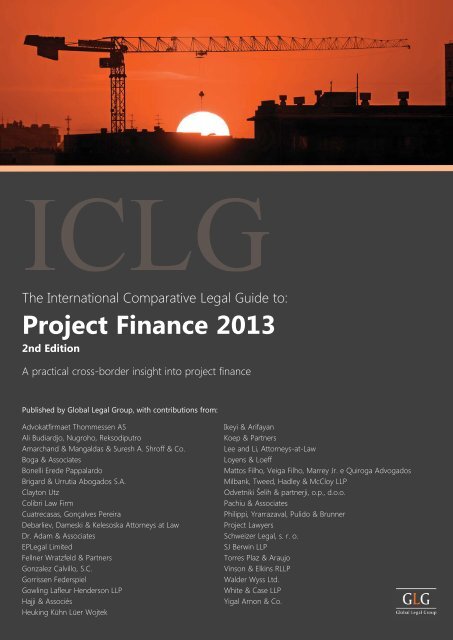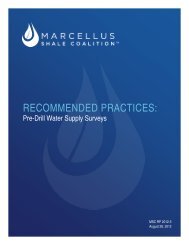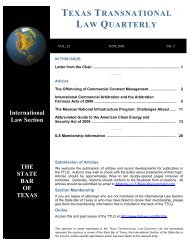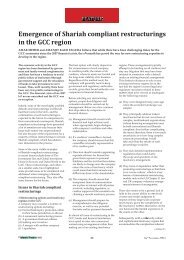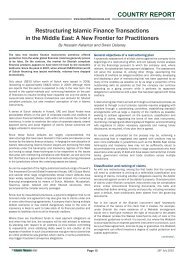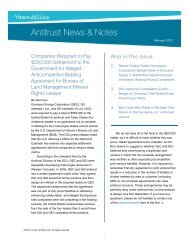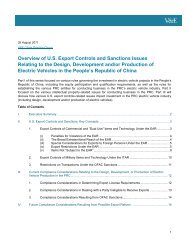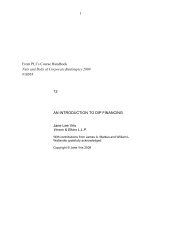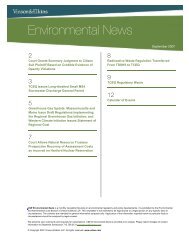here - Vinson & Elkins LLP
here - Vinson & Elkins LLP
here - Vinson & Elkins LLP
Create successful ePaper yourself
Turn your PDF publications into a flip-book with our unique Google optimized e-Paper software.
The International Comparative Legal Guide to:Project Finance 20132nd EditionA practical cross-border insight into project financePublished by Global Legal Group, with contributions from:Advokatfirmaet Thommessen ASAli Budiardjo, Nugroho, ReksodiputroAmarchand & Mangaldas & Suresh A. Shroff & Co.Boga & AssociatesBonelli Erede PappalardoBrigard & Urrutia Abogados S.A.Clayton UtzColibri Law FirmCuatrecasas, Gonçalves PereiraDebarliev, Dameski & Kelesoska Attorneys at LawDr. Adam & AssociatesEPLegal LimitedFellner Wratzfeld & PartnersGonzalez Calvillo, S.C.Gorrissen FederspielGowling Lafleur Henderson <strong>LLP</strong>Hajji & AssociésHeuking Kühn Lüer WojtekIkeyi & ArifayanKoep & PartnersLee and Li, Attorneys-at-LawLoyens & LoeffMattos Filho, Veiga Filho, Marrey Jr. e Quiroga AdvogadosMilbank, Tweed, Hadley & McCloy <strong>LLP</strong>Odvetniki Šelih & partnerji, o.p., d.o.o.Pachiu & AssociatesPhilippi, Yrarrazaval, Pulido & BrunnerProject LawyersSchweizer Legal, s. r. o.SJ Berwin <strong>LLP</strong>Torres Plaz & Araujo<strong>Vinson</strong> & <strong>Elkins</strong> R<strong>LLP</strong>Walder Wyss Ltd.White & Case <strong>LLP</strong>Yigal Arnon & Co.
The International Comparative Legal Guide to: Project Finance 2013General Chapters:1 Why the World Needs Multi-Sourced Project Financings (and Project Finance Lawyers…) –John Dewar & Oliver Irwin, Milbank, Tweed, Hadley & McCloy <strong>LLP</strong> 1Contributing EditorJohn Dewar, Milbank,Tweed, Hadley & McCloy<strong>LLP</strong>Account ManagersBeth Bassett, BrigitteDescacq, Dror Levy, MariaLopez, Florjan Osmani,Oliver Smith, Rory SmithSales Support ManagerToni WyattSub EditorsBeariz ArroyoFiona CanningEditorSuzie KiddSenior EditorPenny SmaleGroup Consulting EditorAlan FalachGroup PublisherRichard FirthPublished byGlobal Legal Group Ltd.59 Tanner StreetLondon SE1 3PL, UKTel: +44 20 7367 0720Fax: +44 20 7407 5255Email: info@glgroup.co.ukURL: www.glgroup.co.ukGLG Cover DesignF&F Studio DesignGLG Cover Image SourceiStockphotoPrinted byAshford Colour Press Ltd.April 2013Copyright © 2013Global Legal Group Ltd.All rights reservedNo photocopyingISBN 978-1-908070-56-2ISSN 2048-688XStrategic Partners2 Reserve Based Lending – Structural Considerations and Challenges – Rinku Bhadoria & Neil Upton,SJ Berwin <strong>LLP</strong> 73 Sunshine and Shifting Sands – Recent Trends and Future Outlook in Oil and Gas Project Financing –Tom Bartlett & Dina Elshurafa, White & Case <strong>LLP</strong> 124 Financing Refinery and Petrochemical Projects: Opportunities and Challenges – Nabil L. Khodadad& Andrew Nealon, <strong>Vinson</strong> & <strong>Elkins</strong> R<strong>LLP</strong> 175 CEMAC Countries: W<strong>here</strong> Harmonised Regulations Shared by Six Central African CountriesFacilitate Project Financings in Emerging Countries – Jean-Pierre Bozec, Project Lawyers 22Country Question and Answer Chapters:6 Albania Boga & Associates: Renata Leka & Besa Velaj (Tauzi) 257 Australia Clayton Utz: Bruce Cooper 338 Austria Fellner Wratzfeld & Partners: Markus Fellner 429 Belgium Loyens & Loeff: Marc Vermylen & Christophe Laurent 5110 Brazil Mattos Filho, Veiga Filho, Marrey Jr. e Quiroga Advogados: Pablo Sorj &Thiago Moreira 6111 Canada Gowling Lafleur Henderson <strong>LLP</strong>: Alison Babbitt & David B. Kierans 6912 Chile Philippi, Yrarrazaval, Pulido & Brunner: Marcelo Armas M. 7713 Colombia Brigard & Urrutia Abogados S.A.: Manuel Fernando Quinche González & CésarRodríguez Parra 8314 Denmark Gorrissen Federspiel: Morten Lundqvist Jakobsen & Tina Herbing 9015 England & Wales SJ Berwin <strong>LLP</strong>: Rinku Bhadoria & Neil Upton 9816 Georgia Colibri Law Firm: Nino Begalishvili & David Kakabadze 10917 Germany Heuking Kühn Lüer Wojtek: Adi Seffer 12118 India Amarchand & Mangaldas & Suresh A. Shroff & Co.: Jatin Aneja 12919 Indonesia Ali Budiardjo, Nugroho, Reksodiputro: Freddy Karyadi & Emir Nurmansyah 13920 Israel Yigal Arnon & Co.: David Schapiro & Peter Sugarman 15021 Italy Bonelli Erede Pappalardo: Catia Tomasetti & Simone Ambrogi 16122 Kazakhstan Colibri Law Firm: Saniya Perzadayeva & Raushana Chaltabayeva 16923 Kosovo Boga & Associates: Sokol Elmazaj & Sabina Lalaj 17924 Kyrgyzstan Colibri Law Firm: Zhanyl Abdrakhmanova & Denis Bagrov 18625 Luxembourg Loyens & Loeff: Vassiliyan Zanev & Xavier Guzman 19426 Macedonia Debarliev, Dameski & Kelesoska Attorneys at Law: Dragan Dameski &Jasmina Ilieva Jovanovikj 20327 Mexico Gonzalez Calvillo, S.C.: Jorge Cervantes & Rodrigo Rojas 21028 Morocco Hajji & Associés: Amin Hajji 22029 Namibia Koep & Partners: Peter Frank Koep & Hugo Meyer van den Berg 22630 Netherlands Loyens & Loeff: Elisabetta Aarts & Gianluca Kreuze 23331 Nigeria Ikeyi & Arifayan: Sola Arifayan & Kenechi Ezezika 24332 Norway Advokatfirmaet Thommessen AS: Berit Stokke & Cathinka Kahrs Rognsvåg 25133 Romania Pachiu & Associates: Alexandru Lefter & Laurentiu Pachiu 25934 Slovakia Schweizer Legal, s. r. o.: Lucie Schweizer & Alexandra Horváthová 26835 Slovenia Odvetniki Šelih & partnerji, o.p., d.o.o.: Mia Kalaš & Blaž Ogorevc 27536 Spain Cuatrecasas, Gonçalves Pereira: Héctor Bros & Jaume Ribó 284Continued OverleafFurther copies of this book and others in the series can be ordered from the publisher. Please call +44 20 7367 0720DisclaimerThis publication is for general information purposes only. It does not purport to provide comprehensive full legal or other advice.Global Legal Group Ltd. and the contributors accept no responsibility for losses that may arise from reliance upon information contained in this publication.This publication is intended to give an indication of legal issues upon which you may need advice. Full legal advice should be taken from a qualifiedprofessional when dealing with specific situations.www.ICLG.co.uk
The International Comparative Legal Guide to: Project Finance 2013Country Question and Answer Chapters:37 Sudan Dr. Adam & Associates: Dr. Mohamed Ibrahim Adam 29438 Switzerland Walder Wyss Ltd.: Thomas Müller-Tschumi & Alexandre Both 30639 Taiwan Lee and Li, Attorneys-at-Law: Joyce C. Fan & Yi-Jiun Su 31540 USA Milbank, Tweed, Hadley & McCloy <strong>LLP</strong>: Eric F. Silverman & Vanessa Pronovost 32241 Uzbekistan Colibri Law Firm: Sofia Shakhrazieva & Umid Aripdjanov 33042 Venezuela Torres Plaz & Araujo: Federico Araujo & Juan Carlos Garantón 34243 Vietnam EPLegal Limited: Nguyen Trung Nam (Tony) & Dang Thi Thu Quyen 349EDITORIALWelcome to the second edition of The International Comparative Legal Guideto: Project Finance.This guide provides corporate counsel and international practitioners with acomprehensive worldwide legal analysis of the laws and regulations of projectfinance.It is divided into two main sections:Five general chapters. These are designed to provide readers with acomprehensive overview of key issues affecting project finance, particularlyfrom the perspective of a multi-jurisdictional transaction.Country question and answer chapters. These provide a broad overview ofcommon issues in project finance laws and regulations in 38 jurisdictions.All chapters are written by leading project finance lawyers and we areextremely grateful for their excellent contributions.Special thanks are reserved for the contributing editor John Dewar of Milbank,Tweed, Hadley & McCloy <strong>LLP</strong>, for his invaluable assistance.Global Legal Group hopes that you find this guide practical and interesting.The International Comparative Legal Guide series is also available online atwww.iclg.co.uk.Alan Falach LL.MGroup Consulting EditorGlobal Legal GroupAlan.Falach@glgroup.co.uk
Chapter 4Financing Refinery andPetrochemical Projects:Opportunities and ChallengesNabil L. Khodadad<strong>Vinson</strong> & <strong>Elkins</strong> R<strong>LLP</strong>Andrew NealonBackgroundDue to their size, scale and complexity, refinery and petrochemicalprojects are among the most interesting and challenging projects tofinance. They tend to have long construction periods of up to three,four and even five years which means that lenders have to wait along time before their borrower is able to start operating andgenerating the cash flows required to service their loans. Moreover,projects of the scale typically found in this sector require differenttranches of financing from multiple sources: multilateral andbilateral development agencies; export credit agencies;international and local commercial banks; and occasionally Islamicfinanciers. As the different providers of finance have differentperspectives, requirements and capabilities, it can take a long timeto negotiate a common set of financing terms and conditions(though t<strong>here</strong> will inevitably will be differences in the tenor andpricing of each tranche). Moreover, it can be a real challenge toaddress all the intercreditor issues, particularly those presented bythe preferred creditor status of multi-lateral development banks.This chapter surveys recent trends in the refining and petrochemicalindustries and in the manner in which financing for projects in suchindustries have been sourced and outlines some of the typicalfinancing terms and key requirements for the limited recoursefinancing of such projects. While refinery and petrochemical projectspresent somewhat different issues, they share many common featuresand for that reason we have chosen to cover both industries in thischapter. Indeed, one recent trend is for companies to better lock invalue through deeper integration of refineries with petrochemicals.Recent Industry TrendsThe last decade has brought about many changes in the refining andpetrochemical industries. While t<strong>here</strong> has been a decline in t<strong>here</strong>fining industry in Western Europe and the USA, the industry hasbeen growing significantly in non-OECD countries. While manyvertically integrated European oil and gas companies are sheddingtheir refineries, oil and gas companies are building new refineries inChina and the Middle East and integrating them more closely withtheir upstream activities. In the last five years major financingshave included the Jubail Refinery (Saudi Arabia), the EgyptianRefinery Company Refinery (Egypt), the Guru Gobind SinghBhatinda Refinery (India), the Jamnagar 2 Refinery (India), theParadip Refinery (India) and the Grupa Lotos Gdansk RefineryExpansion (Poland). Several other major refinery financings areexpected to complete in 2013, with both the SOCAR Turcas AegeanRefinery in Turkey and the Nghi Son refinery in Vietnam expectedto achieve financial close later this year. According to theInfrastructure Journal, the bulk of new project financed refineriesICLG TO: PROJECT FINANCE 2013© Published and reproduced with kind permission by Global Legal Group Ltd, Londonto be built between 2012 and 2020 are likely to be located in non-OECD countries, particularly in India, the Middle East and NorthAfrica and the Asia Pacific region.T<strong>here</strong> have also been a lot of recent changes in the petrochemicalindustry. Natural gas prices in the USA have plummeted as a resultof the shale gas boom and the USA now enjoys some of the world’scheapest natural gas (the primary feedstock for most petrochemicalprojects). A decade ago high natural gas prices forced manypetrochemical companies to shut down or scale back theiroperations; now the USA has become one of the most attractivedestinations for investment and many new petrochemical plants areexpected to be constructed t<strong>here</strong> within the next decade.The petrochemical industry is also continuing to pursue projects inother jurisdictions which benefit from low feedstock costs. T<strong>here</strong> hasbeen and is projected to be a lot of investment in the petrochemicalsector in the gas-rich regions of Russia, Central Asia, and the Gulf(particularly in Saudi Arabia and Qatar). For example, the largestproject financing in the emerging markets in 2012 was Uz-Kor GasChemical LLC’s approximately US$ 4 billon integrated upstream gasand petrochemical complex in the Ustyurt region of Uzbekistan. Theproject will be supplied with gas and condensate as raw materialsfrom the Surgil field, which will be licensed to and operated by Uz-Kor, and other gas fields operated by Uzbekneftegaz. Uz-Kor willproduce and sell gas for the Uzbek market, as well as high-densitypolyethylene, polypropylene, and other petrochemical products forthe local and export markets. The US$2.54 billion debt financing forthis project includes direct loans from the Export-Import Bank ofKorea (Kexim), China Development Bank, Asian Development Bankand the National Bank for Foreign Economic Activity of the Republicof Uzbekistan for a total amount of US$1.175 billion, and US$1.365billion of loans is being provided by nine commercial banks undercovered facilities from Kexim, Korea Trade Insurance Corporation(Ksure), Euler Hermes and Exportkreditnämnden (EKN).Recent Trends in the Sourcing of Project FinanceAfter the onset of the Financial Crisis in 2007, commercial banksscaled back their lending to energy and infrastructure projects,including refining and petrochemical projects. This problem hasbeen compounded by banking downgrades and Eurozoneinstability, which have had a disproportionate impact on Europeanbanks, traditionally the dominant commercial lenders in projectfinance. Moreover, the recent increase in capital requirementsintroduced by Basel III will make it more expensive for commercialbanks to use their capital to support long-term financings.Increasingly, commercial banks are allocating their scarce capital tokey relationship clients.WWW.ICLG.CO.UK17
<strong>Vinson</strong> & <strong>Elkins</strong> R<strong>LLP</strong>Financing Refinery and Petrochemical Projects18Fortunately, export credit agencies (ECAs) and multilateraldevelopment banks (such as the International Finance Corporation,European Bank for Reconstruction and Development, AsianDevelopment Bank, African Development Bank and Inter-American Development Bank) have increased their lending toenergy and infrastructure projects. As refinery and petrochemicalprojects tend to source services, equipment and works from avariety of OECD countries, it is often possible for sponsors to adopta contracting strategy which ensures that a large portion of theservices, equipment and works are sourced from countries whoseexport credit agencies are willing and able to support their exportersby providing financing for such projects.Export credit agency financing can either take the form of directlending or the guarantee or insurance of loans provided bycommercial banks under covered loan facilities. The pricing andtenor of export credit agency financing tends to compare favourablywith other sources of financing. Under the OECD’s Arrangementon Officially Supported Export Credits, export credit agencies areable to extend loans with a tenor of up to 14 years from the startingpoint of credit (or provisional acceptance of the downstreamfacility), which (depending on the duration of the constructionperiod) can equate to 18 years door-to-door. In many large-scaledownstream financings, ECA direct and/or covered facilitiesaccount for the bulk of the financing provided.Multilateral development banks also have played an increasinglyimportant role in financing refining, petrochemical and other energyand infrastructure projects in emerging markets. Through their ALoan/B Loan umbrella loan structure, they are able to extend thebenefits of their preferred creditor status to international commercialbanks and make it more attractive for such banks to participate in afinancing, particularly one with long tenors.Key Financing Terms for a Downstream ProjectThe ultimate debt capacity of a refinery or petrochemical projectwill depend on its underlying economics and on the results ofvarious sensitivities run under the financial model. Typically, thesponsors and lenders will run sensitivities for changes in certain keyvariables such as interest rates, feedstock prices, project costs,technical performance, product prices and operating costs.Although the results of such economic and sensitivity analysis willvary from project to project, most recent projects in the refining andpetrochemical sector that have been financed on a limited recoursebasis have been done so at a debt to equity ratio of about 65:35.Typically the sponsors are entitled to fund their equity in someagreed combination of share capital and deeply subordinatedshareholder loans.One key issue is when the sponsors will be required to contributetheir equity to the project company. Sponsors typically prefer tofund their equity pro rata with the senior debt, while lenderstypically prefer that the sponsors fund their equity upfront. Oftenthis issue is resolved by having the sponsors fund a portion of theirequity upfront, with the balance funded pro rata with senior debt,and usually the greater the level of completion support provided bythe sponsors, the more flexible the lenders are on this issue.In almost all refining projects and in most petrochemical projects,the sponsors are required to give a completion guarantee (or debtservice undertaking) w<strong>here</strong>by they agree to guarantee t<strong>here</strong>payment of the project loans at any time prior to achieving“Project Completion” or if Project Completion is not achieved by acertain long-stop date. Project Completion is typically defined tobe the date when the refinery or petrochemical facility has beencommissioned and achieves substantial or provisional acceptanceunder the relevant engineering, procurement and construction(EPC) contract, satisfied the lenders’ reliability test demonstratingover a period of time that it can reliably operate in accordance withcertain performance criteria, met certain financial tests and receivedall required governmental approvals and licences to operate and theproject company has complied with all applicable covenants(including any covenants relating to environmental or socialmatters) under the relevant finance documents, funded a debtservice reserve account to the required level (typically an amountequal to 6 months’ debt service) and satisfied certain othercustomary conditions to Project Completion. As the financing willtypically become non-recourse to the sponsors after it is achieved,the definition of Project Completion is often subject to muchnegotiation.In some projects it has been possible for the sponsors to convincethe lenders to drop their requirement for a completion guarantee (ordebt service undertaking) and to replace it instead with a cappedcontingent equity facility under which the sponsors agree tocontribute more equity to the project company if t<strong>here</strong> is a projectcost overrun (including for additional interest during construction inthe event of a delay) or the project company is required to buy downa portion of the senior debt in the event that the project does notachieve the performance guarantees assumed by the base caseprojections under the financial model. This is only possible w<strong>here</strong>the sponsors are able to demonstrate that they have a robust lumpsum turnkey EPC contract from reputable, experienced andcreditworthy contractor(s) and have otherwise properly managedconstruction risk. For example, in the financing of the EgyptianRefining Company’s new hydro-cracking complex in Mostorod,Qeliobya, Egypt, which was Project Finance International’s“Middle East Petrochemical Deal of 2012”, and in the financingof Uz-Kor’s Surgil gas to chemicals project in Uzbekistan, whichwas Project Finance International’s “European PetrochemicalDeal of 2012”, the sponsors were able to provide a contingentequity facility in lieu of a completion guarantee and such facilitywas capped at a much lower level than the amount of the seniordebt. In sizing a contingent equity facility, lenders (with theassistance of their technical adviser) will take into account the riskof a delay in achieving provisional or substantial acceptance, therisk that t<strong>here</strong> will be a cost overrun, the level of contingencies setout in the approved project budget and the risk of the refinery orpetrochemical facility not meeting the technical performanceguarantees assumed by the base case.As refining margins and petrochemical product prices tend to becyclical, the loan repayment profile for most refinery andpetrochemical financings is designed to give the project companysome flexibility so that in good times it can repay principal morequickly and in lean times principal can be repaid more slowly.Typically, this flexibility is effected by having two amortisationschedules: a mandatory loan amortisation schedule which mustalways be met to avoid being in default and a target loanamortisation schedule which the project company must meet to theextent that it has sufficient excess cash flow after covering operatingcosts, taxes, interest, commitment and other lender fees, principalpayments required under the mandatory repayment schedule and thefunding of certain reserve accounts. The project company will bebarred from making any dividends, distributions or payments onsubordinated shareholder loans to the sponsors if at the relevant timeit has not achieved the target loan amortisation schedule.Addressing Key Project RisksIn a project financing, the lenders look primarily to the cash flowsof the project they are financing instead of to the credit of theWWW.ICLG.CO.UKICLG TO: PROJECT FINANCE 2013© Published and reproduced with kind permission by Global Legal Group Ltd, London
<strong>Vinson</strong> & <strong>Elkins</strong> R<strong>LLP</strong>Financing Refinery and Petrochemical Projectssponsor(s) of such project. T<strong>here</strong>fore, potential lenders willconduct extensive due diligence on any refining or petrochemicalproject to ensure that all relevant risks have been identified andaddressed. The following is a non-exhaustive list of some of thekey issues which lenders to a refinery or petrochemical projectwould expect the sponsors to address.1. Completion RiskThe lenders, as well as the sponsors, will want to ensure that theproject is built on time and in accordance with the performanceparameters set out in the base case. If completion of the refinery orpetrochemical facility is significantly delayed or if such facility isunable to meet the performance standards contemplated by the basecase, then the project company may have difficulty generating thecash flow required to make principal and interest payments withrespect to the loans when due.To mitigate this risk, the lenders typically insist that the projectcompany enter into a fixed price EPC contract with a reliable,experienced and creditworthy contractor(s). Under an EPC contractfor a refinery or petrochemical project, the contractor(s) would berequired to guarantee the completion of the project by a defineddate and give certain performance guarantees, including a guaranteeof throughput, a guarantee of the slate of products the refinery orpetrochemical facility is capable of producing and a guarantee ofutility consumption. In the event that the contractor fails tocomplete the project by the required date, the EPC contract wouldprovide for the contractor to pay delay liquidated damages. In theevent that the performance falls short of the guaranteedperformance levels, the EPC Contract would provide forperformance liquidated damages to be paid by the contractor. Ineach case, t<strong>here</strong> are limits to the applicability of liquidateddamages. After an extended period of delay, delay liquidateddamages would hit their cap and the EPC contractor would face therisk of having its EPC contract terminated for its default. Similarly,performance liquidated damages only apply to limited shortfalls inperformance. Performance above a defined minimum level will bemandatory and no buydown by the EPC contractor would apply tosuch shortfalls.As mentioned above, the lenders will also require that the sponsorsprovide a completion guarantee or some other form of completionsupport until project completion is achieved. In our experience, theweaker the sponsor completion support, the more robust the transferof risk onto the contractor under the EPC contract needs to be.2. Technology RiskLenders will want to ensure that the refinery or petrochemicalfacility uses process technology which has been tested and provenon a commercial scale, and generally at the scale of the project inquestion. This is not typically an issue for a refinery project sincemost of the processing methods currently used in the refiningindustry have been in commercial use for several decades.Occasionally this has been an issue for petrochemical projects. Forexample, a certain gas to liquids project experienced difficulty inachieving the performance levels required to satisfy the lender’sProject Completion test and was ultimately unable to satisfy suchtest. It is essential that the project company enter into a licensingand technology transfer agreement with one the leading licensors ofsuch technology. Track record of licensors and their technology isparticularly important as the license and technology transferagreement customarily are subject to limited recourse against thelicensors and have low relative caps on liability when compared tothe damage to a project caused by failed process technology. At thesponsor and lender level, this risk can sometimes be mitigated bywrapping the process technology risk within the contractor’sresponsibility under the EPC contract.3. General Operating RiskAs oil refining and petrochemical production are very specialisedindustries, the lenders will want to ensure that the project companyhas the ability to properly operate and maintain the refinery orpetrochemical facility once it has been completed. As projectcompanies are generally special purpose companies with no priorhistory, the sponsors need to demonstrate that it will have suchexpertise in time for relevant training and commencement ofoperations. If the sponsors cannot demonstrate that the projectcompany will have such capability in time, the lenders will requirethe project company to enter into an operation and maintenanceagreement with an experienced third party operator w<strong>here</strong>by suchthird party agrees to perform the operation and maintenance of thefacility. It is not uncommon for lenders to encourage sponsorswithout a track record in operations to form a joint venture with acompany with substantial experience in the relevant industry.4. Feedstock Supply RiskLenders will want to ensure that the project company enters intolong-term feedstock supply agreements with reliable suppliers offeedstock. The arrangements will differ depending on the how thefeedstock is to be delivered (pipeline or tanker) and the flexibilityof the facility to process different feedstock. For example, aninland petrochemicals project which relies on gas delivered bypipeline will have more onerous supply guarantees than a seaboardrefinery with its own jetty which can process a wide variety ofcrudes. In any event, what the lenders will want to see is certaintyof supply. While they may be willing to accept market pricing, theyare less willing to take a risk on feedstock volume. As such,feedstock supply agreements generally impose deliver or payobligations on the supplier so that liquidated damages are levied ift<strong>here</strong> is a failure to deliver. The term of the feedstock supplycontracts are customarily a few years longer than the final loanmaturity date under the loan facilities.5. Market RiskLenders will want to ensure that t<strong>here</strong> is a robust market for theproduct slate to be produced by the facility. Lenders generally seekthe advice of a market consultant to evaluate and opine on thestrength of the market and the project company’s marketingstrategy. Even w<strong>here</strong> the market is generally robust, the lenderswill likely require the project company to enter into long termofftake contracts for some or all its products with creditworthyofftakers. Similar to the supply side, the lenders will want to ensurethat the offtakers comply with the terms of the offtake agreementsand will t<strong>here</strong>fore expect to see take or pay obligations in eachofftake contract. The term of the offtake contracts is customarily afew years longer than the final maturity date under the loanfacilities.6. Price RiskAs the purchase price for hydrocarbon feedstock and as the saleprice for products are likely to be determined under the relevantcontracts by reference to a market price, the lenders will want toensure that the margin between the two sets of prices is likely to besufficiently large to ensure that the refinery or petrochemicalfacility will generate enough cash flow to service their loans, aswell as to pay dividends to the sponsors. In conducting suchanalysis, the lenders will look not only to the pricing formulas setout in the feedstock supply and product sale agreements, but willalso look at historic and projected global and regional margins forthe products in question.7. Currency RiskAs the lenders are likely to denominate and disburse their loans inUS dollars, the lenders will want to make sure that the projectcompany has access to hard currency to service its loans. TheICLG TO: PROJECT FINANCE 2013© Published and reproduced with kind permission by Global Legal Group Ltd, LondonWWW.ICLG.CO.UK19
<strong>Vinson</strong> & <strong>Elkins</strong> R<strong>LLP</strong>Financing Refinery and Petrochemical Projectsproject company is also likely to have a portion of its operatingexpenses in US dollars and will also need hard currency to meetsuch dollar denominated operating expenses. It is vital that eitherall or a significant portion of such products are denominated andsold for US dollars or alternatively that arrangements are put inplace to ensure that the project company can convert all or a portionof its local currency revenues into US dollars.8. Legal and Fiscal RiskLenders will want comfort that the project company and the projectwill operate in a legal and fiscal framework which is stable. If theagreements that document the project cannot be enforced in the hostcountry, then the lenders will have no confidence in the contractualframework for the project. Likewise, the lenders will want toensure fiscal stability. In preparing their financial model, thelenders will make certain assumptions about the fiscal regime thatwill apply to the project company and the project. If thoseassumptions turn out to be incorrect, then the project company maynot generate sufficient after-tax net income to service the loans.If the project is sited in a country with a stable and well developedlegal system, lenders are often willing to take this risk. However, ifthe project is sited in an emerging market with a developing legaland economic system, lenders will often insist that the projectcompany or sponsors enter into an implementation agreement orhost government agreement with the host country which stabilisesthe fiscal regime (and perhaps, to some extent, the legal regime)applicable to the project company and project and contains anundertaking to issue any acquired consents or approvals. Theimplementation agreement often includes undertakings from thesponsors and/or the project company to invest a certain minimumamount in the project, provide training to local employees and, tothe extent competitive in terms of price and quality, give preferenceto local suppliers and vendors. The implementation agreement orhost agreement would also include language allowing the lenders torely on such stabilisation and other undertakings and to step into theshoes of the project company and enforce such undertakings if theirloans went into default.For example, to support the Nghi Son refinery project in Vietnam,the Vietnamese Government entered into a Government Guaranteeand Undertaking Agreement which set out the applicable currency,legal, taxation and offtake regimes for such project. Likewise, theGovernment of Uzbekistan entered into an Investment Agreementto create legal and fiscal stability for Uz-Kor’s gas to chemicalsproject in Uzbekistan.9. Political RiskLenders will also want to make sure that, to the extent possible,political risks – e.g., the risk of expropriation, nationalisation,revocation of licences and approvals, government interference,political violence, terrorism and civil war – are mitigated. To someextent, these risks can be mitigated by having the host governmententer into an implementation agreement with respect to the project,especially if such agreement provides for international arbitration inthe event of a dispute. T<strong>here</strong> is also a wide variety of publicproviders of political risk insurance, such as the MultilateralInvestment Guarantee Agency (part of the World Bank Group) andthe Overseas Private Investment Corporation (a US agency) thatspecialise in taking political risk. The participation of multilateraldevelopment agencies is one way to reduce political risk since thehost government itself will be a shareholder or member of suchagency and the agency can use its clout with the host government totry to assist the project company and sponsors in resolving anydisputes which may arise with the host government. Moreover,multilateral development agencies (and to a lesser extent) exportcredit agencies have been established in part to assume political risk.10. Environmental and Social RiskLenders not only look to the risks referred to above but also toenvironmental and social risks. In this area multilateral financialinstitutions such as the International Bank for Reconstruction andDevelopment and its sister institution the International FinanceCorporation (which are both part of the World Bank group) lead theway. Under World Bank standards, proposed projects are classifiedinto one of three categories depending on the type, location,sensitivity and scale of project and the nature and magnitude oftheir potential environmental and social impacts, with category Aprojects having the greatest environmental and social impacts andCategory C projects having the least. Most greenfield refinery orpetrochemical projects are likely to be considered Category Aprojects.Under the World Bank approach, the project company or anindependent third party expert must have consulted in a “structuredand culturally sensitive way” with the indigenous peoples and localNGOs in the region of the planned refinery or petrochemicalfacility. A full environmental and social assessment, normally inthe form of a study, must be prepared to examine the project’spotential positive and negative environmental impacts, comparingthem to a refinery or petrochemical project those of feasiblealternatives and recommending any measures required to mitigateenvironmental impacts and improve environmental performance.An environmental management plan must also be prepared by theproject company or a third party expert that draws on theconclusions of the environmental and social assessment andaddresses issues such as mitigation, action plans and managementof risks.About 70 commercial banks, representing over 85% of thecommercial bank project finance market, have adopted the“Equator Principles” under which they agree to comply with theWorld Bank’s approach to environmental and social issues(including the World Bank’s performance standards) for projects inexcess of $10 million. T<strong>here</strong>fore, even if no member of the WorldBank group is involved in the financing of a refinery orpetrochemical project, it is quite likely that some of the otherlenders will be required to comply with the Equator Principles.OECD export credit agencies have also adopted a commonapproach to environmental and social issues which is similar to thatof the World Bank.ConclusionThe refining and petrochemical industries are dynamic and thefinancing of projects in such sectors presents not only manychallenges but also many opportunities. While these sectors andfinancing markets may be changing, with careful structuring andplanning project finance can be utilised to great effect in this newand challenging environment.20WWW.ICLG.CO.UKICLG TO: PROJECT FINANCE 2013© Published and reproduced with kind permission by Global Legal Group Ltd, London
<strong>Vinson</strong> & <strong>Elkins</strong> R<strong>LLP</strong>Financing Refinery and Petrochemical ProjectsNabil L. KhodadadAndrew Nealon<strong>Vinson</strong> & <strong>Elkins</strong> R<strong>LLP</strong>CityPoint, 33rd Floor, One Ropemaker StreetLondon, EC2Y 9UEUnited KingdomTel: +44 20 7065 6057Fax: +44 20 7065 6001Email: nkhodadad@velaw.comURL: www.velaw.comNabil Khodadad is a partner based in <strong>Vinson</strong> & <strong>Elkins</strong> R<strong>LLP</strong>’sLondon office and is global co-head of the Project Financepractice. Nabil has been based in London for more than twodecades and has extensive experience in project finance. He hasadvised on oil and gas, pipeline, petrochemical, mining andmetals, power and other projects in more than 35 countries. Nabilhas also served on the Documentation Committee of the LondonMarket Association (LMA).Nabil’s experience includes advising on the Azeri-Chirag-Gunashli Upstream project financing, SOCAR Turcas AegeanRefinery project, Surgil gas, polypropylene and polyethyleneproject, Mubarek polyethylene project, Petkim PetroKimyarefinancing, Shtokman gas, condensate and LNG project, PreemPetroleum refinery financing and Petrotel-Lukoil refinerymodernisation financing.Nabil has been ranked as a leading project finance lawyer byChambers and Partners in the 2007 to 2013 Chambers UKGuides.<strong>Vinson</strong> & <strong>Elkins</strong> R<strong>LLP</strong>CityPoint, 33rd Floor, One Ropemaker StreetLondon, EC2Y 9UEUnited KingdomTel: +44 20 7065 6025Fax: +44 20 7065 6001Email: anealon@velaw.comURL: www.velaw.comAndrew is a partner based in <strong>Vinson</strong> & <strong>Elkins</strong> R<strong>LLP</strong>’s Londonoffice and is a member of the firm’s Energy Transactions andProjects practice group. Andrew advises on project finance,primarily in the energy and infrastructure sectors. Andrew hasextensive experience in engineering, procurement andconstruction (EPC) contracts. Andrew’s experience includesadvising on the SOCAR Turcas Aegean Refinery project, Surgilgas, polypropylene and polyethylene project, Mubarekpolyethylene project, Shtokman gas, condensate and LNGproject and Rabigh petrochemical project.Andrew is ranked as a “Leader in their Field” in Projects byChambers UK, 2013.With roots in energy extending nearly a century, <strong>Vinson</strong> & <strong>Elkins</strong> continues to be recognised as the “World’s Leading Energy LawFirm” (Euromoney, 1995-2013). Over the past year, lawyers from our 16 offices around the world advised clients on more than1,600 energy and infrastructure matters – collectively valued at over US$167 billion.The firm represents a broad cross-section of the top players in the energy industry. Our experience (which spans every part ofthe energy chain from upstream oil and gas exploration and production, to LNG, pipelines, processing, refining, to retail sales andpower generation) includes: the project development and finance; acquisition, development, sale, and financing of energy assets;structuring and negotiating energy-related transactions, joint ventures and partnership arrangements; and engineering,procurement and construction advice.The firm has a diverse, worldwide project development and finance practice, with particular depth of experience in energy-relatedprojects. Our project development and finance lawyers have participated in a broad array of award-winning projects throughoutthe world, including projects involving refineries, petrochemical plants, oil, natural gas and products pipelines, LNG and LPGfacilities, power plants, mines, hospitals, telecommunications, ports, roads, water systems, and other infrastructure.ICLG TO: PROJECT FINANCE 2013© Published and reproduced with kind permission by Global Legal Group Ltd, LondonWWW.ICLG.CO.UK21
Current titles in the ICLG series include:Alternative Investment FundsAviation LawBusiness CrimeCartels & LeniencyClass & Group ActionsCommodities and Trade LawCompetition LitigationCorporate GovernanceCorporate Recovery & InsolvencyCorporate TaxDominanceEmployment & Labour LawEnforcement of Competition LawEnvironment & Climate Change LawInsurance & ReinsuranceInternational ArbitrationLending & Secured FinanceLitigation & Dispute ResolutionMerger ControlMergers & AcquisitionsMiningOil & Gas RegulationPatentsPFI / PPP ProjectsPharmaceutical AdvertisingPrivate ClientProduct LiabilityProject FinancePublic ProcurementReal EstateSecuritisationShippingTelecoms, Media & InternetTrade Marks59 Tanner Street, London SE1 3PL, United KingdomTel: +44 20 7367 0720 / Fax: +44 20 7407 5255Email: sales@glgroup.co.ukwww.iclg.co.uk


